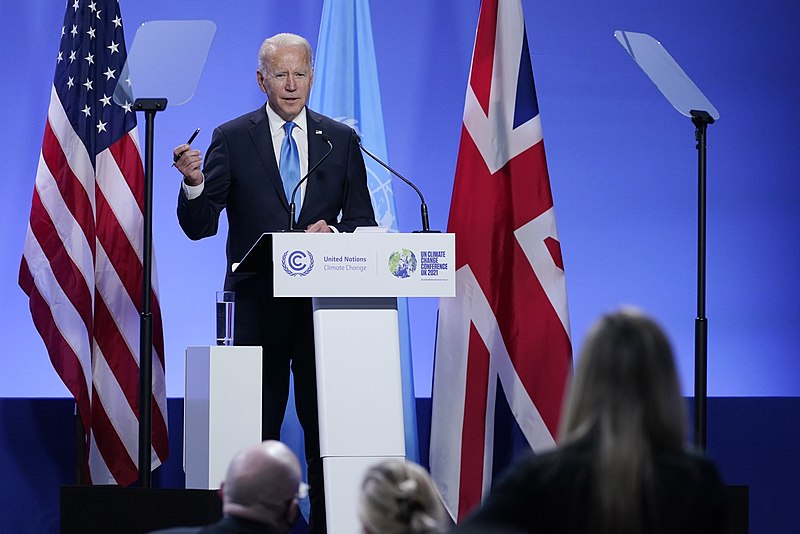US President Joe Biden has officially signed the bipartisan infrastructure bill into law this week. As the law is set to take effect, Biden has also appointed former New Orleans mayor Mitch Landrieu to oversee its implementation.
Prior to the signing of the bill into law, Biden appointed Landrieu to the role of “infrastructure czar” that will oversee the billions of federal funding and the law’s implementation. This follows a week after the House passed the bipartisan bill that had already passed the Senate back in August. The bill would go into transportation systems, roads, bridges, airports, as well as expand broadband internet access and clean drinking water.
“In this role, Landrieu will oversee the most significant and comprehensive investments in American infrastructure in generations -- work that independent experts verify will create millions of high-paying, union jobs while boosting our economic competitiveness in the world, strengthening our supply chains, and acting against inflation for the long term,” the White House said in a statement.
Landrieu served as the mayor of New Orleans in 2010 in the aftermath of Hurricane Katrina as the city struggled to recover from the natural calamity. Landrieu also served as Louisiana’s lieutenant governor.
Biden has already stressed that it would be weeks or months before the public can start seeing the effects of the bipartisan infrastructure bill. Biden is also looking to rely on its passage in a political sense, in time for the 2022 midterm elections, which will determine which party controls the House and the Senate.
In other related news, BBC reports Biden has signed legislation that would stop companies suspected to be a security threat from receiving new telecommunication equipment licenses. The legislation, also known as the Secure Equipment Act, says the Federal Communications Commission will no longer review applications from companies marked as a threat.
This would mean that equipment from Chinese companies like Huawei, ZTE, and three others cannot be used in US telecom networks. The legislation was passed on a bipartisan vote in the Senate back in October along with the majority of the House, with four representatives opposing the legislation.



 Anutin’s Bhumjaithai Party Wins Thai Election, Signals Shift Toward Political Stability
Anutin’s Bhumjaithai Party Wins Thai Election, Signals Shift Toward Political Stability  U.S.-India Trade Framework Signals Major Shift in Tariffs, Energy, and Supply Chains
U.S.-India Trade Framework Signals Major Shift in Tariffs, Energy, and Supply Chains  Federal Judge Restores Funding for Gateway Rail Tunnel Project
Federal Judge Restores Funding for Gateway Rail Tunnel Project  US Pushes Ukraine-Russia Peace Talks Before Summer Amid Escalating Attacks
US Pushes Ukraine-Russia Peace Talks Before Summer Amid Escalating Attacks  Trump Administration Appeals Court Order to Release Hudson Tunnel Project Funding
Trump Administration Appeals Court Order to Release Hudson Tunnel Project Funding  Japan Election 2026: Sanae Takaichi Poised for Landslide Win Despite Record Snowfall
Japan Election 2026: Sanae Takaichi Poised for Landslide Win Despite Record Snowfall  Pentagon Ends Military Education Programs With Harvard University
Pentagon Ends Military Education Programs With Harvard University  Israel Approves West Bank Measures Expanding Settler Land Access
Israel Approves West Bank Measures Expanding Settler Land Access  Bangladesh Election 2026: A Turning Point After Years of Political Suppression
Bangladesh Election 2026: A Turning Point After Years of Political Suppression  Japan’s Prime Minister Sanae Takaichi Secures Historic Election Win, Shaking Markets and Regional Politics
Japan’s Prime Minister Sanae Takaichi Secures Historic Election Win, Shaking Markets and Regional Politics  U.S. Lawmakers to Review Unredacted Jeffrey Epstein DOJ Files Starting Monday
U.S. Lawmakers to Review Unredacted Jeffrey Epstein DOJ Files Starting Monday  Trump Allows Commercial Fishing in Protected New England Waters
Trump Allows Commercial Fishing in Protected New England Waters  Trump Signs Executive Order Threatening 25% Tariffs on Countries Trading With Iran
Trump Signs Executive Order Threatening 25% Tariffs on Countries Trading With Iran  China Warns US Arms Sales to Taiwan Could Disrupt Trump’s Planned Visit
China Warns US Arms Sales to Taiwan Could Disrupt Trump’s Planned Visit  Trump Backs Nexstar–Tegna Merger Amid Shifting U.S. Media Landscape
Trump Backs Nexstar–Tegna Merger Amid Shifting U.S. Media Landscape  Bosnian Serb Presidential Rerun Confirms Victory for Dodik Ally Amid Allegations of Irregularities
Bosnian Serb Presidential Rerun Confirms Victory for Dodik Ally Amid Allegations of Irregularities  Trump Says “Very Good Talks” Underway on Russia-Ukraine War as Peace Efforts Continue
Trump Says “Very Good Talks” Underway on Russia-Ukraine War as Peace Efforts Continue 































